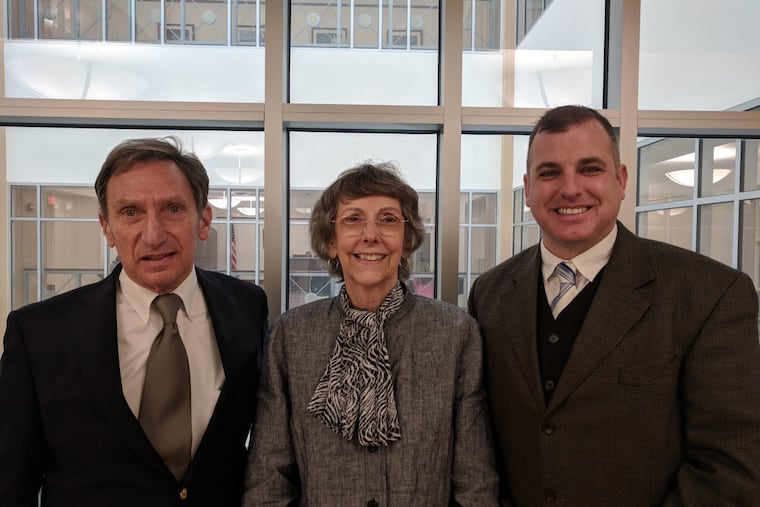Pa.'s map is so gerrymandered that random computer maps are fairer, expert says
Just days after closing arguments in a federal gerrymandering trial, a separate, state trial began in Harrisburg.

HARRISBURG — Pennsylvania's congressional map is so skewed toward Republicans that computer software tasked with randomly drawing maps produced hundreds of drawings that were more politically neutral, according to testimony Monday on the opening day of a state gerrymandering trial.
"Partisan intent predominated the drawing" of the current congressional map, said University of Michigan political science professor Jowei Chen, an expert witness testifying for the group of Pennsylvania voters bringing the challenge.
Republicans have won 13 of the state's 18 seats in the House of Representatives since the map was adopted in 2011, even as votes in statewide and national elections have been roughly split between Democrats and Republicans.
Chen said his software had generated 500 maps on what he called "traditional redistricting principles," which included keeping populations equal across districts and avoiding splitting up counties and towns. The majority of the maps drawn had nine Republican districts and nine Democratic districts, he said, calling the 13-5 GOP margin under the current mapping an "extreme statistical outlier."
Republicans credit other factors for their successes, including the fact that Democratic voters tend to cluster in the state's urban areas.
Chen's testimony will continue Tuesday; the defense has not yet cross-examined him.
Suing under the Pennsylvania Constitution, the 18 voters — one for each of the state's congressional districts — accuse Republican lawmakers of discriminating against Democratic voters by intentionally drawing the congressional map to maximize the number of Republican U.S. representatives elected.
The lawsuit is one of several that have popped up around the country challenging the mapping of congressional and legislative districts. This case, League of Women Voters v. Commonwealth of Pennsylvania, was filed in June and the trial comes the week after a separate federal gerrymandering trial was heard in Philadelphia. A decision in that case is pending. A third case has been filed in federal court and is currently stayed until early January.
If this challenge — fast-tracked by the state Supreme Court — is successful, it could force a redrawing of Pennsylvania's congressional map in time for the 2018 elections.
The case is in some ways similar to Gill v. Whitford, a gerrymandering case out of Wisconsin that is before the U.S. Supreme Court, in that much of the argument rests on the use of new ways of calculating how skewed a map is in one party's favor.
Those new tests that have been developed in recent years generally agree with experts' consensus: Pennsylvania's congressional map is among the most gerrymandered.
"The map falls on the wrong side of the constitutional line — it intentionally, severely, durably, and unjustifiably discriminates against Democratic candidates and voters," wrote Nick Stephanopoulos, a University of Chicago professor who developed the "efficiency gap" measure at the heart of Whitford and that will be used in this case. "The political scientists' tools make the legal analysis easy and reliable."
In this trial, he wrote, the state lawmakers are "trying to defend the indefensible."
Showing that the map is skewed is the first part of the argument brought by the Philadelphia-based Public Interest Law Center, which is representing the group of voters bringing the state challenge.
They also hope to show that the skewing is intentional, relying in part on evidence that was turned over by House Speaker Mike Turzai and Senate President Pro Tempore Joe Scarnati in last week's separate federal trial, Agre v. Wolf.
Commonwealth Court Judge P. Kevin Brobson had blocked attempts by the Public Interest Law Center to force Turzai and Scarnati to turn over the documents, but a three-judge panel ordered them produced for the federal case. Plaintiff lawyers then shared the documents with the Public Interest Law Center.
Both sides sparred Monday morning over that evidence, which includes files that Turzai turned over showing that mapmakers used detailed partisanship data in drawing the congressional districts.
Attorneys for Republican lawmakers said that admission of those documents would be a breach of legislative privilege, which is intended to shield lawmakers' deliberations in their work.
"We're sort of in uncharted territory here," Brobson said. "This is difficult and I am struggling with it."
After a recess, he issued a ruling allowing some of the documents to be admitted.
The trial is expected to last through the week, and Brobson has been tasked with issuing conclusions by the end of the year, which the state Supreme Court will then use to make its decision.
That decision is expected early in January. A successful challenge could reshape the 2018 elections; lawyers for the state said in the federal trial that to maintain the current primary schedule they would need to know by Jan. 23 whether a new map would be used.